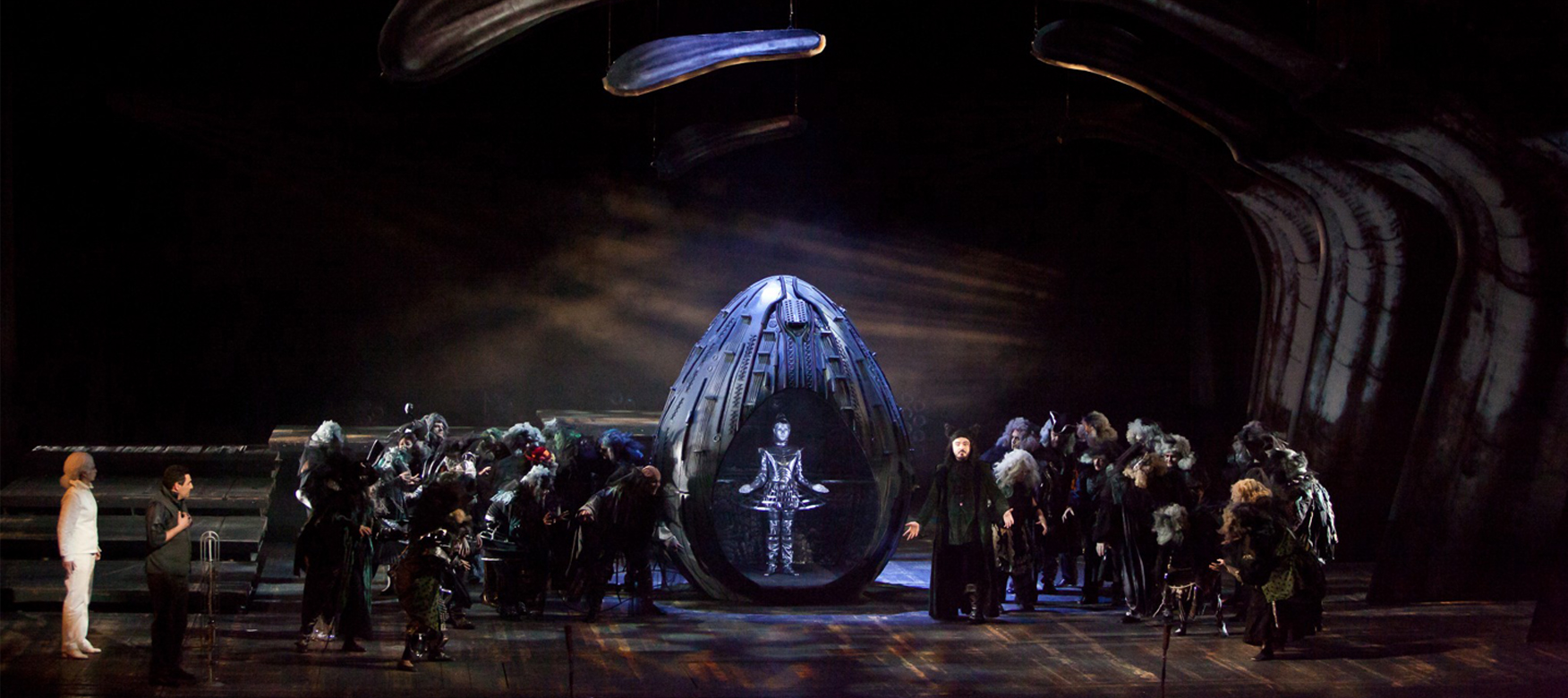
- This event has passed.

Les contes d’Hoffmann (The Tales of Hoffmann) is an opéra by Jacques Offenbach. The French libretto was written by Jules Barbier, based on three short stories by E. T. A. Hoffmann. Hoffman himself is used as the main protagonist in the opera. Barbier and Michel Carré had previously written a play, Les contes fantastiques d’Hoffmann, which was produced at the Odéon Theatre in Paris in 1851, and which Offenbach had seen…
Conductor: Andrea Certa (Italy)
Director: Ursula Horner (Austria)
Set designer: Marija Veteroska
Costume designer: Marija Pupuchevska
Light Design: Vasil Lisichov
Choreography: Ursula Horner and Olga Pango
Concert master: Kliment Todoroski
Ass. Director: Ljupka Jakimovska
Ass. Costume designer: Marta Trendafilova
Ass. Chorus master: Gjurgica Dashikj, Jasmina Gjorgjeska
Piano Accompanists: Janinka Nevcheva, Elena Siljanoska, Andrej Naunov
Prompters: Pavlina Zdravkova, Svetlana Georgieva, Nevena Georgieva
Stage managers: Ljupcho Polizov, Dragan Kostadinovikj, Marko Pavlevski
CAST:
Hoffmann: Rafael Álvarez (Mexico)
Nicklausse: Nikolina Janevska
Olympia: Nade Talevska
Giulietta: Marija Naumovska
Antonia: Deshira Ahmeti
Lindorf, Dapertutto : Andrea Zaupa (Italy)
Coppélius, Dr.Miracle: Ernes Ibraimovski
Andrès: Dejan Stoev
Cochenille: Jane Dunimagloski
Pitichinaccio: Dejan Stoev
Frantz: Jane Dunimagloski
Luther: Dime Petrov
Spalanzani: Zoran Danilov
Crespel: Vladimir Sazdovski
The Voice: Katerina Boshkovska
Schlémil: Neven Siljanovski
THE TALES OF HOFFMANN
Synopsis
I ACT
PROLOGUE
A tavern in Nuremberg. The prima donna Stella, currently performing Mozart’s Don Giovanni sends a letter to Hoffmann (famous German writer), requesting a meeting in her dressing room after the performance. The letter and the key to the room are intercepted by Councillor Lindorf, who is incarnation of evil, Hoffmann’s nemesis. Lindorf intends to replace Hoffmann at the rendezvous. In the tavern students are waiting for the famous poet, Hoffmann. He, with his friend Nicklausse, phantasmagorical character, who is Hoffmann guardian angel and his alter ego, finally arrives and entertains them with the legend of Klainzach the dwarf (story based on the fairy tale “Klein Zaches genannt Zinnober”). Coaxed by Lindorf, Hoffmann is telling the students about his life’s three great loves.
(Olympia)
Hoffmann’s first love is Olympia, an automaton created by the scientist Spalanzani. Hoffmann falls in love with her, not knowing that Olympia is a mechanical doll. Nicklausse, who knows the truth about Olympia, sings a story of a mechanical doll that looked like a human to warn Hoffmann. But Hoffmann’s love enchantment prevents him to see the message. Coppélius, the creator of Olympia’s eyes and Spalanzani’s co-operator, sells Hoffmann magic glasses which make Olympia appear as a real woman. Olympia sings one of the opera’s most famous arias in which she periodically runs down and needs to be started up before she can continue. Hoffmann is tricked into believing that his affections are returned, to the bemusement of Nicklausse, who subtly tries to warn his friend. At the same time, Coppélius appears and destroys Olympia, in retaliation for having been tricked out by Spalanzani. With the crowd laughing at him, Hoffmann realizes that he was in love with an automaton. This story is based on the work “Der Sandmann”.
II ACT
(Giulietta)
Venice. The act opens with the barcarolle (folk song sung by Venetian gondoliers). Hoffmann falls in love with the courtesan Giulietta and thinks his affections are returned. Giulietta is not in love with Hoffmann but only seducing him under the orders of Captain Dapertutto, who has promised to give her a diamond if she filches Hoffmann’s reflection from a mirror. Hoffmann meets Giulietta and cannot resist her and gives her his reflection. The jealous Schlemil, a previous victim of Giulietta and Dapertutto (he gave Giulietta his shadow), challenges the poet to a duel, but is killed. Abandoned by the courtesan, to Dapertuto’s great pleasure Hoffmann finally finds himself. This story is based on “Die Abenteuer der Silvester-Nacht”.
(Antonia)
Munich. Hoffmann and Antonia loved each other, but were separated when Crespel decided to hide his daughter from Hoffmann. Antonia has inherited her mother’s talent for singing, but her father forbids her to sing because of the mysterious illness from which she is suffering. Antonia wishes that her lover would return to her. Her father also forbids her to see Hoffmann, who is encouraging Antonia in her musical career, and is therefore a danger to her without knowing it. Crespel tells Frantz, his servant, to stay with his daughter. When Crespel leaves his house, Hoffmann takes advantage of the occasion to sneak in, and the lovers are reunited. When Crespel comes back, he receives the visit of Dr Miracle, the act’s Nemesis, who forces Crespel to let him heal Antonia. Still in the house, Hoffmann listens to the conversation and learns that Antonia may die if she sings too much. He returns to her room to make her promise to give up her artistic dreams. Antonia reluctantly accepts her lover’s will. Once she is alone, Dr Miracle enters Antonia’s room and tries to persuade her to sing and follow her mother’s path to glory, stating that Hoffmann is sacrificing her to his brutishness and loves her only for her beauty. He creates a vision of Antonia’s dead mother and induces Antonia to sing, causing her death. Crespel arrives just in time to witness his daughter’s last breath. This act is based on “Rath Krespel”
EPILOGUE
The tavern in Nuremberg. Hoffmann, drunk, swears he will never love again, and explains that Olympia, Antonia, and Giulietta are three facets of a same person, Stella, his unrealized love. When Hoffmann says he does not want to love any more, Nicklausse reveals himself and reclaims Hoffmann: “Be reborn a poet! I love you, Hoffmann! Be mine!” The magic of poetry reaches Hoffmann as he sings “Muse whom I love, I am yours!”